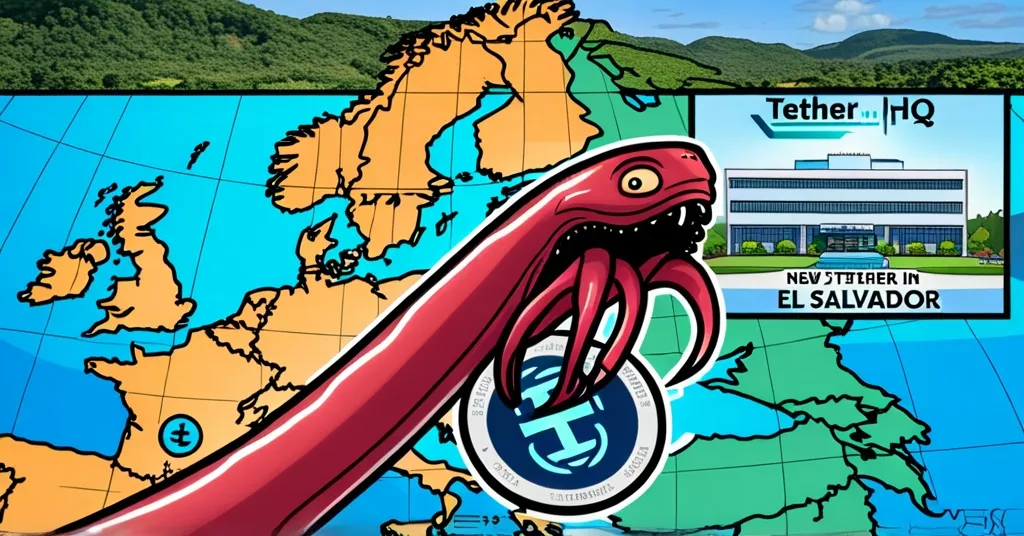Kraken Halts Tether Trading in Europe by March 31 Due to MiCA

Kraken to Shutter Tether Trading in Europe by March 31
Kraken, a prominent cryptocurrency exchange, will halt support for Tether (USDT) and other non-compliant stablecoins for its European clients by March 31, 2024, due to the European Union’s Markets in Crypto Assets (MiCA) Regulation. This regulatory push joins Coinbase and Crypto.com in delisting Tether across Europe, signaling a shift towards stricter compliance. Meanwhile, Tether reports a record-breaking $13 billion in profits for 2024 and continues its global expansion by establishing new headquarters in El Salvador.
- Kraken to stop supporting Tether in Europe by March 31, 2024
- EU’s MiCA Regulation driving the decision
- Aligns with delisting by Coinbase and Crypto.com
- Tether’s $13 billion profit surge and move to El Salvador
Kraken’s Delisting of Tether
Kraken’s decision to delist Tether from its European platform is a direct response to the European Union’s Markets in Crypto Assets (MiCA) Regulation. MiCA, aimed at protecting investors and ensuring market integrity, sets stringent compliance standards for crypto assets, including stablecoins like Tether. Stablecoins are cryptocurrencies designed to maintain a stable value, often pegged to a currency like the US dollar.
“While these changes weren’t needed until this point, recently updated guidance from European regulators led us to this decision to delist these assets to ensure our clients have enough time to take necessary action,” Kraken stated in an email to its users. This move underscores the broader trend among major exchanges to adapt to the EU’s regulatory environment, following Coinbase and Crypto.com in delisting Tether.
Tether’s Financial Strength and Global Expansion
Despite regulatory challenges in Europe, Tether remains a powerhouse in the crypto world. The company reported a staggering $13 billion in profits for 2024, largely driven by an increase in U.S. Treasuries as part of its reserves. This financial muscle has allowed Tether to expand its operations globally, with a significant move to El Salvador, a country known for its embrace of cryptocurrencies.
Tether has established new headquarters in El Salvador, with CEO Paolo Ardoino and other founders relocating to the region. The move not only signifies a strategic expansion but also a commitment to hiring 100 Salvadorans over the next few years. El Salvador’s crypto-friendly policies make it an ideal location for Tether to navigate regulatory headwinds elsewhere.
Impact on Crypto Users and the Ecosystem
The delisting of Tether by major exchanges in Europe poses a challenge for users who rely on USDT for transactions. European clients will need to explore alternative stablecoins or platforms that comply with the MiCA Regulation. This shift could drive interest in other stablecoins that meet the new regulatory standards, potentially reshaping the crypto landscape in Europe.
On a broader level, these regulatory actions highlight the ongoing tension between the decentralized ethos of cryptocurrencies and the need for regulatory oversight. While some may see this as a setback for crypto’s disruptive potential, others view it as a necessary step towards mainstream adoption and stability.
What This Means for You
For European crypto users, the delisting of Tether necessitates a reevaluation of trading strategies. Consider exploring alternative stablecoins that comply with MiCA, such as those pegged to the Euro or other currencies. Additionally, keep an eye on how other exchanges adapt to these regulatory changes, as they may offer new opportunities for trading and investment.
As the crypto world continues to evolve, the interplay between regulation and innovation will remain a critical factor. Tether’s move to El Salvador is a reminder that while some regions tighten the screws, others are rolling out the welcome mat for crypto enterprises. This dynamic landscape offers both challenges and opportunities for those willing to navigate it.
Key Questions and Answers
- What prompted Kraken to delist Tether in Europe?
The need to comply with the European Union’s Markets in Crypto Assets (MiCA) Regulation framework.
- Which other exchanges have delisted Tether in Europe?
Coinbase and Crypto.com have also delisted Tether in Europe.
- How is Tether responding to these delistings?
Tether is focusing on global expansion, reporting record profits and establishing new headquarters in El Salvador.
- What is the significance of El Salvador in Tether’s strategy?
El Salvador’s crypto-friendly environment and supportive regulatory stance make it a strategic location for Tether to expand its operations and establish a physical presence.



